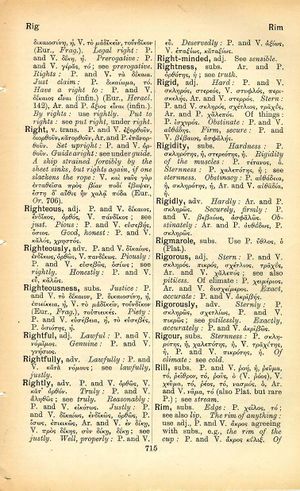rightly: Difference between revisions
From LSJ
Ξενίας ἀεὶ φρόντιζε, μὴ καθυστέρει → Cura hospitalis esse nec in hoc sis piger → Sei stets auf Gastfreundschaft bedacht und säume nicht
(Woodhouse 4) |
(CSV4) |
||
| Line 1: | Line 1: | ||
{{ | {{Woodhouse1 | ||
| | |Text=[[File:woodhouse_715.jpg|thumb|link={{filepath:woodhouse_715.jpg}}]]'''adv.''' | ||
P. and V. ὀρθῶς, V. κατʼ ὀρθόν. | |||
<b class="b2">Truly</b>: P. and V. ἀληθῶς; see [[truly]]. | |||
<b class="b2">Reasonably</b>: P. and V. [[εἰκότως]]. | |||
<b class="b2">Justly</b>: P. and V. δικαίως, ἐνδικῶς, ὀρθῶς, P. [[ἴσως]], ἐπιεικῶς, Ar. and V. ἐν δίκῃ, V. πρὸς δίκης, σὺν δίκῃ, δίκῃ; see [[justly]]. | |||
<b class="b2">Well, properly</b>: P. and V. [[εὖ]]. | |||
<b class="b2">Deservedly</b>: P. and V. ἀξίως, V. ἐπαξίως, καταξίως. | |||
}} | }} | ||
Revision as of 09:50, 21 July 2017
English > Greek (Woodhouse)
adv.
P. and V. ὀρθῶς, V. κατʼ ὀρθόν. Truly: P. and V. ἀληθῶς; see truly. Reasonably: P. and V. εἰκότως. Justly: P. and V. δικαίως, ἐνδικῶς, ὀρθῶς, P. ἴσως, ἐπιεικῶς, Ar. and V. ἐν δίκῃ, V. πρὸς δίκης, σὺν δίκῃ, δίκῃ; see justly. Well, properly: P. and V. εὖ. Deservedly: P. and V. ἀξίως, V. ἐπαξίως, καταξίως.

